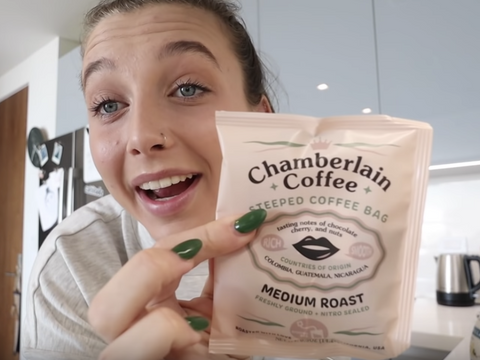
Brewing Success: A Guide on How to Start a Coffee Shop (UK)
Thinking of setting up a coffee shop in the UK? It is no surprise... The nation is one of the largest coffee-consuming countries in Europe, making it an excellent opportunity for coffee lovers and entrepreneurs. But where do you start?
There is a lack of information available, and that is where we want to help. As coffee roasters, we know a thing or two about how to start a coffee shop in the UK. If you are ready to make your dreams a reality, see the comprehensive guide below:
What do You Need to Start a Coffee Shop?

- Business Plan
When starting a coffee shop, you must have a business plan because it outlines the key elements of your business and acts as a roadmap for your future success.
A typical coffee shop business plan will include several key components;
- Executive summary
- Market analysis
- Business concept
- Financial projection
- Marketing and sales strategies
- Operations
- Management and organisational structure
It is critical to spend a considerable amount of time and energy on your business plan. It will help you determine whether your idea will succeed and what is needed to bring it to life.
2. Funding
Once you have a business plan, you will know how much it will cost to start and run your coffee shop, including the costs of equipment, inventory, staff, etc.
With this information, you can seek funding. There are several options for this, such as;
- Loans - From banks and other financial institutions
- Grants - Given from organisations and government agencies, we recommend searching on Grants Management Function.
- Investors - Usually from angel investors, peer-to-peer lenders, or venture capitalists.
- Personal savings or crowdfunding - Either out of your pocket or from raising money through crowdfunding platforms like Gofundme.
When finding funding, present a well-written business plan demonstrating the potential for success. Funding should be a breeze if it looks profitable with reliable figures and proper research.
3. Location
Including the above, you need a location. This can depend on your business plan and goals, but there are usually three options you'll want to consider;
- Brick and mortar - A traditional storefront cafe found in shopping centres, downtown areas, etc. In the UK, rent can cost anywhere from £85 per sq. ft. in Bristol to £2,000 per sq. ft. in some places in London.
- On-the-road - A mobile coffee shop like a food truck or trailer, meaning you can go to festivals, events, and different locations. Prices can vary, but usually are around £5,000 - £50,000 for the truck or trailer. You will also need to account for parking permits.
- Ghost kitchen - A delivery-only option that is prepared and packaged for over the phone or online ordering through apps like Uber Eats. You can even get other coffee shops to make your orders, which will only cost a percentage of your revenue.
Consider potential footfall, competition, target market, and general goals when choosing a location. This will help you finalise your decision.
4. License, Permits, and Insurances
You will also require licenses, permits, and insurances. Failure to have the proper ones may result in fines, penalties, or even the closure of your business.
These might include the following:
- Food business registration
- Food premise approval
- Premises license
- Public liability insurance
- Employer's liability insurance
- Building insurance
- Music licence
Please remember that these are licenses, permissions, and insurance that you MAY require. Depending on the type of coffee shop you open, there could be others.
5. Equipment
When you open a coffee business, you will require equipment. Ideally, it would help if you got them from high-quality companies to ensure that each drink is perfectly crafted.
The type of equipment you will need will be determined by the type of coffee shop you intend to start. However, from a general standpoint, it might consist of the following:
- Espresso machines - They can cost thousands and usually come from brands like La Marzocco, Victoria Arduino and Nuova Simonelli
- Coffee bean grinder - A large, commercial coffee grinder is essential for a coffee shop. These come from brands like Mahlkonig, which start at £1,700.
- Coffee brewer - Used for pour-over coffee and can cost a few hundred pounds; you will also need filter papers.
- Milk steamer - For steaming and frothing milk for espresso-based drinks, it can cost a few hundred pounds alone. However, these usually come attached to high-quality espresso machines.
- Refrigerator - To keep your milk and other perishable items cool, costing a few hundred pounds to several thousand.
- Glassware or disposable cups - This can vary depending on the quality but can range up to a few hundred pounds.
- Other equipment - You may also want to consider digital scales, cash registers, point of sales systems, water filtration systems, cleaning supplies, chairs and tables, cutlery, plates, etc.
When choosing your equipment, create a budget and stick with it. Going over budget can cause financial strain, which is what you do not want at the beginning of a business.
6. Coffee
One of the most important items to have in a coffee shop; COFFEE! You need a good, reliable supplier that can deliver high-quality coffee regularly.
Again, the type of coffee you want will depend on the shop you open. However, we recommend the following:
- Highwire - A Chipp Coffee Co Signature Blend
- Brazil - Classic espresso choice
- Colombia - Sweet and special single origin
Depending on the footfall and the amount of coffee you buy at once, prices can vary.
7. Staff
Like most of the "Must-haves" to open a coffee shop on this list, it all depends on your type of shop. With staff, you may only need yourself, a few people, or an entire team.
However, for a better idea of who you might need and the costs, see below:
- General manager - Around £26,653 yearly
- Baristas - Around £22,000 yearly
- Waiters - Around £21,0000 yearly
Again, this all depends on your business. For instance, you might not need waiters if it is a small shop, or you might not need a general manager if you oversee it yourself.
If you need staff, remember to leave a part of the budget for training. You might do this yourself or enrol them in courses.
8. Branding & Marketing
A successful coffee business requires branding and marketing. A strong brand identity can help you stand out from the crowd, and a solid marketing plan can guarantee that people are aware of your shop.
The cost of branding and marketing in the UK might vary based on the size of your business and the sort of campaigns you want to run. You should allocate between 2 and 5 per cent of your monthly revenue to cover this. Website design and development, advertising, printing materials, and social media campaigns should be included in this price.
How much does it cost to start a coffee shop?
As you can see, there is a lot to consider when setting up a coffee shop in the UK. The costs of opening one can vary greatly, depending on the type, location, and much more. However, if we look at a broad figure, you are looking at anywhere between £5,000 for a truck or trailer and £25,000+ for a small coffee shop.
Conclusion
After reading the above, we hope you have gained a more comprehensive understanding of how to start a coffee shop in the UK. Undoubtedly, there are a lot of moving parts. However, once you are up and running, these moving parts become easier to manage. If you are ready to take the leap into starting your own shop, be sure to check out our range of coffee products.
Are you ready to take the next steps?
Get in touch with us here, we are always happy to walk you through every step of the process.









